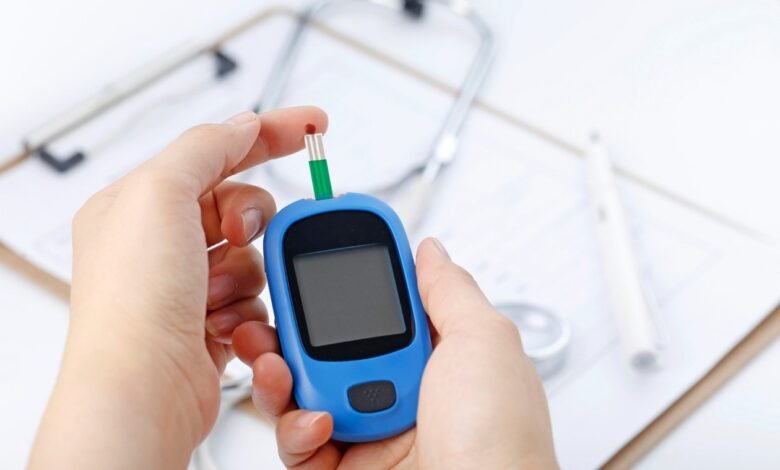The Causes, Symptoms, and Treatments of Diabetes

In the realm of chronic health conditions, diabetes is a significant and widespread concern affecting millions worldwide. Understanding the complexities of this metabolic disorder is not just a matter of health awareness but a crucial step toward effective management and prevention. Welcome to “The Causes, Symptoms, and Treatments of Diabetes,” a comprehensive guide that will unravel the intricate web of factors contributing to diabetes, shed light on the often subtle but significant symptoms and explore the diverse array of treatments available for individuals affected by this condition.
Treatments of Diabetes
Diabetes, in its various forms, represents a condition where the body’s ability to regulate blood sugar levels is impaired. Left unmanaged, it can lead to many complications, affecting nearly every system in the body. Through this guide, we will embark on a journey to demystify diabetes, examining the distinct causes, risk factors, and genetic predispositions that play a role in its development.
Moreover, we will delve into the subtle and sometimes elusive symptoms that may signal the presence of diabetes and discuss the wide spectrum of treatments and lifestyle changes that can help individuals with diabetes lead healthier and more fulfilling lives. Whether you’re personally affected by diabetes or simply seeking to expand your knowledge of this widespread condition, this guide provides the insights to make informed decisions about your health and well-being.
What Is Diabetes?
Diabetes, also known as diabetes mellitus, is a group of metabolic disorders characterized by elevated blood sugar levels over an extended period. This occurs when the body’s ability to produce or use insulin, a hormone responsible for regulating blood sugar, is impaired.
There are different types of diabetes, but the common factor among them is the presence of elevated blood sugar levels. These high blood sugar levels can adversely affect the body over time.
Read More: Silent Signs of Diabetes Revealed in 2023
Types of Diabetes
Type 1 Diabetes
Type 1 Diabetes, often called juvenile diabetes, is a chronic medical condition characterized by the body’s immune system mistakenly attacking and destroying insulin-producing beta cells in the pancreas. This autoimmune response leaves individuals with Type 1 diabetes lifelong dependent on external insulin delivery.
Here are some key features of Type 1 Diabetes:
Autoimmune Nature: The exact cause of Type 1 diabetes is not fully understood, but it is believed to involve genetic predisposition and environmental triggers. In this condition, the immune system, which normally protects the body from infections, turns against the insulin-producing cells in the pancreas. As a result, the pancreas can no longer produce insulin.
Insulin Dependency: Insulin is a vital hormone regulating blood sugar levels. Without insulin, glucose (sugar) from our food cannot enter cells for energy, leading to elevated blood sugar levels.
Onset in Childhood or Adolescence: Type 1 diabetes often develops in childhood or adolescence, although it can occur at any age. Its sudden onset can be alarming, with symptoms appearing rapidly.
Symptoms: Common symptoms of Type 1 diabetes include excessive thirst, frequent urination, unexplained weight loss, extreme hunger, fatigue, and blurred vision. These symptoms result from high blood sugar levels and the body’s inability to use glucose effectively.
Treatment: Management of Type 1 diabetes revolves around replacing the lost insulin. This is typically done through multiple daily insulin injections or an insulin pump. The goal is to keep blood sugar levels within a target range to prevent short-term complications like hyperglycemia (high blood sugar) and long-term complications such as heart disease, kidney problems, and nerve damage.
Monitoring: People with Type 1 diabetes must regularly monitor their blood sugar levels, often several times daily. Continuous glucose monitoring systems are also available to provide real-time data on blood sugar trends.
Dietary Considerations: While there are no strict dietary restrictions for those with Type 1 diabetes, maintaining a balanced diet and counting carbohydrates can help manage blood sugar levels. Meal planning and consistency in carbohydrate intake are crucial.
Emotional and Psychological Impact: Living with Type 1 diabetes can be physically and emotionally challenging. Managing this condition requires a strong support system and coping with the demands of daily diabetes care.
In summary, Type 1 Diabetes is an autoimmune condition that results in a lifelong reliance on insulin therapy. It requires careful monitoring, a balanced diet, and lifestyle adjustments to ensure that blood sugar levels remain within a healthy range, minimizing the risk of complications associated with high blood sugar levels.
Type 2 Diabetes
Type 2 Diabetes, often called adult-onset diabetes, is a chronic metabolic disorder characterized by the body’s inability to effectively use insulin or produce enough of it. This condition is closely associated with lifestyle factors and is the most common form of diabetes.
Here are some key features of Type 2 Diabetes:
Lifestyle Factors: Unlike Type 1 diabetes, Type 2 diabetes is strongly linked to lifestyle choices. Factors such as an unhealthy diet, lack of physical activity, and obesity play a significant role in its development.
Insulin Resistance: In Type 2 diabetes, the body’s cells become resistant to the effects of insulin. Even though the pancreas may produce insulin, it’s not used efficiently, leading to elevated blood sugar levels.
Age and Onset: Type 2 diabetes typically develops in adulthood but can occur at any age, including in children and adolescents. It tends to progress gradually, and the onset may be less abrupt than in Type 1 diabetes.
Symptoms: Common symptoms of Type 2 diabetes include increased thirst, frequent urination, unexplained weight loss, fatigue, and blurred vision. These symptoms are similar to Type 1 diabetes and result from elevated blood sugar levels.
Risk Factors: Certain risk factors increase the likelihood of developing Type 2 diabetes. These include a family history of diabetes, being overweight or obese, physical inactivity, poor diet (especially one high in sugar and unhealthy fats), and age.
Treatment: Management of Type 2 diabetes focuses on lifestyle changes, oral medications, and, in some cases, insulin therapy. Lifestyle modifications, including dietary improvements and increased physical activity, are essential for controlling blood sugar levels.
Monitoring: Regular monitoring of blood sugar levels is crucial for individuals with Type 2 diabetes. This helps to assess the effectiveness of treatment and make necessary adjustments.
Dietary Considerations: A balanced diet is fundamental in managing Type 2 diabetes. This includes controlling carbohydrate intake, consuming more fiber-rich foods, and limiting the consumption of sugary and processed foods.
Complications: If left unmanaged, Type 2 diabetes can lead to various health complications, such as heart disease, stroke, kidney problems, nerve damage, and eye issues. This underscores the importance of effective treatment and blood sugar control.
Prevention: Unlike Type 1 diabetes, Type 2 diabetes can often be prevented or delayed through lifestyle changes. Maintaining a healthy weight, regular physical activity and a nutritious diet are key preventive measures.
Gestational Diabetes
Gestational diabetes occurs during pregnancy when blood sugar levels rise higher than normal. It usually resolves after childbirth, but women who experience it are at an increased risk of developing Type 2 diabetes later in life.
Causes of Diabetes
Genetic Factors
Treatments of Diabetes: Genetics plays a significant role in diabetes. Your risk may be higher if you have a family history of the condition.
Lifestyle Choices
Unhealthy lifestyle choices, such as a diet high in sugary foods and beverages, lack of exercise, and smoking, can increase the risk of diabetes.
Obesity
Excess body weight, especially abdominal obesity, is a major risk factor for Type 2 diabetes.
Insulin Resistance
Insulin resistance means your body doesn’t respond effectively to insulin, leading to elevated blood sugar levels.
Common Symptoms of Diabetes
Increased Thirst and Hunger
Treatments of Diabetes: Even after eating, frequent feelings of thirst and hunger can be early signs of diabetes.
Frequent Urination
Excessive urination, particularly at night, is a common symptom of diabetes.
Fatigue
Chronic fatigue and weakness can result from the body’s inability to use glucose for energy effectively.
Blurred Vision
High blood sugar levels can affect the eyes, causing blurry vision or difficulty focusing.
Diagnosis and Testing
Treatments of Diabetes: To diagnose diabetes, several tests are available:
Fasting Blood Sugar Test
This test measures blood sugar levels after an overnight fast.
Oral Glucose Tolerance Test (OGTT)
A glucose solution is consumed, and blood sugar levels are tested regularly.
Hemoglobin A1c Test
This test provides an average blood sugar level over the past few months.
Complications of Diabetes
Treatments of Diabetes: Untreated or poorly managed diabetes can lead to various complications:
Cardiovascular Issues
Diabetes increases the risk of heart disease and stroke.
Kidney Problems
Diabetes can damage the kidneys, leading to kidney disease or failure.
Neuropathy
Nerve damage can cause tingling, numbness, or pain, particularly in the extremities.
Eye Conditions
Diabetes can lead to vision problems and even blindness.
Managing Diabetes
Treatments of Diabetes: Effective diabetes management is essential for a healthy life. It typically involves:
Medication
Doctors may prescribe insulin or other medications to regulate blood sugar.
Diet and Nutrition
A balanced diet, low in sugar and carbohydrates, is crucial for managing blood sugar levels.
Exercise
Regular physical activity can improve insulin sensitivity and overall health.
Monitoring Blood Sugar
Regular blood sugar monitoring helps track progress and adjust treatment as needed.
Treatment Options
Treatments of Diabetes: Several treatment options are available depending on the type and severity of diabetes:
Insulin Therapy
For Type 1 diabetes and some cases of Type 2, insulin therapy is necessary.
Oral Medications
Type 2 diabetes may be managed with oral medications that help the body use insulin more effectively.
Lifestyle Changes
Healthy lifestyle changes often reduce or eliminate the need for medication.
Prevention
Preventing diabetes involves making smart choices:
Healthy Eating
Eating a balanced diet with plenty of fruits and vegetables can reduce the risk of diabetes.
Regular Exercise
Physical activity helps maintain a healthy weight and improve insulin sensitivity.
Weight Management
Maintaining a healthy weight is crucial in preventing Type 2 diabetes.
Living with Diabetes
Managing diabetes is not just about physical health:
Emotional Well-being
Coping with diabetes can be emotionally challenging, so seeking support is essential.
Support Networks
Joining support groups or working closely with healthcare providers can make managing diabetes more manageable.
Read More: Exercise and Diabetes: A Powerful Combination for Better Health
Conclusion
Diabetes is a complex and widespread medical condition that demands attention and understanding. It affects individuals in various ways, and its management requires lifestyle changes, medication, and emotional support.
Complications stemming from diabetes, such as cardiovascular issues, kidney problems, neuropathy, and eye conditions, underscore the significance of consistent monitoring and care.
Diabetes management involves a holistic approach encompassing medication, dietary adjustments, physical activity, and emotional well-being. It’s not just about controlling blood sugar levels; it’s about living a fulfilling life despite the conditions.
FAQs
What is the primary cause of Type 2 diabetes?
Poor lifestyle choices, including an unhealthy diet and lack of exercise, primarily cause type 2 diabetes.
Can diabetes be completely cured?
While Type 1 diabetes cannot be cured, Type 2 diabetes can often be managed and even reversed with lifestyle changes.
How often should I check my blood sugar levels?
The frequency of blood sugar monitoring varies but is typically recommended before meals and at bedtime.
Is gestational diabetes a significant concern for pregnant women?
Gestational diabetes should be closely monitored, but it often resolves after childbirth.
Are there any breakthrough treatments for diabetes on the horizon?
Ongoing research explores new treatments and potential cures, but more is needed.







